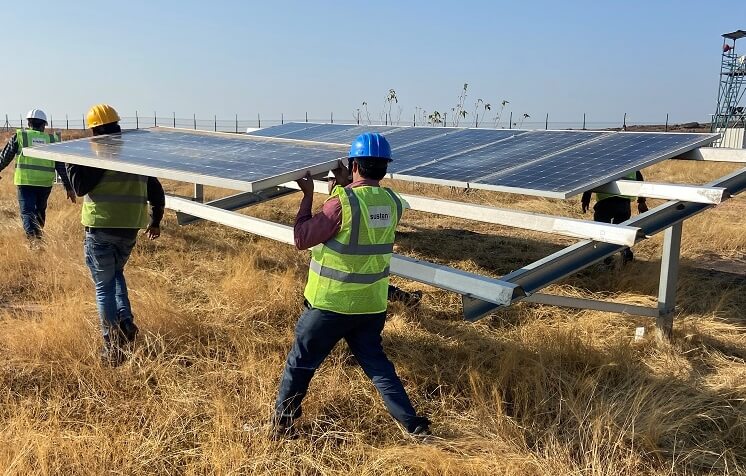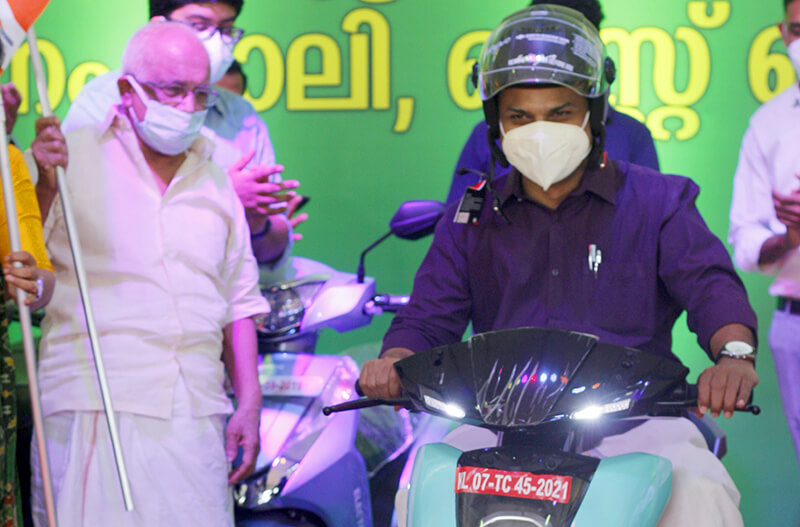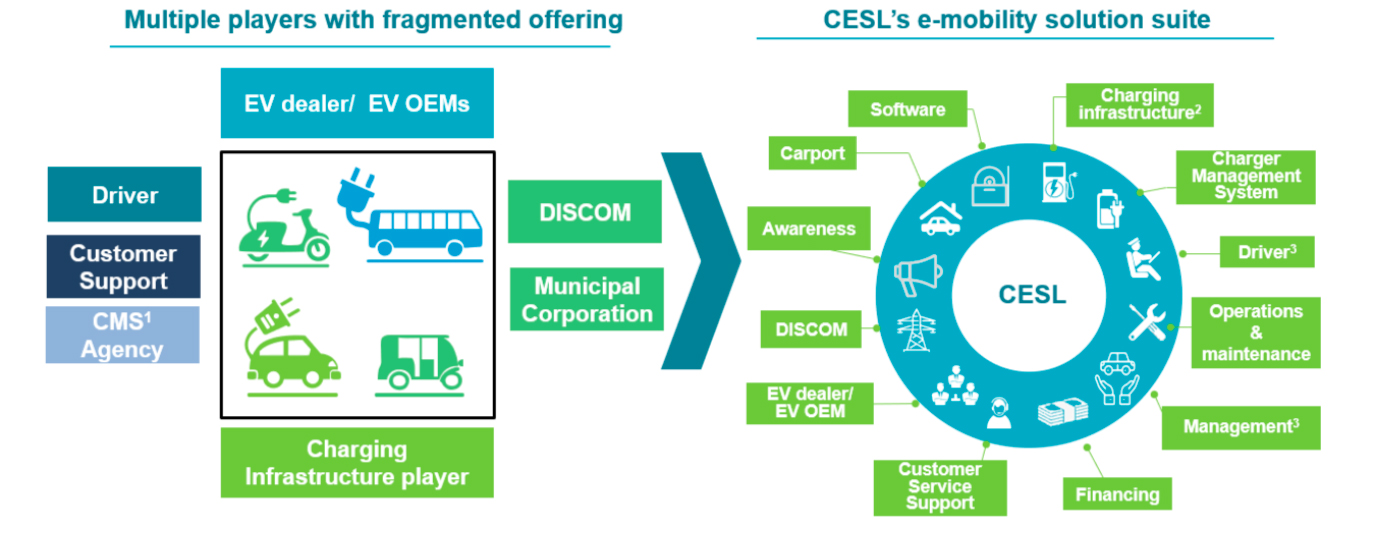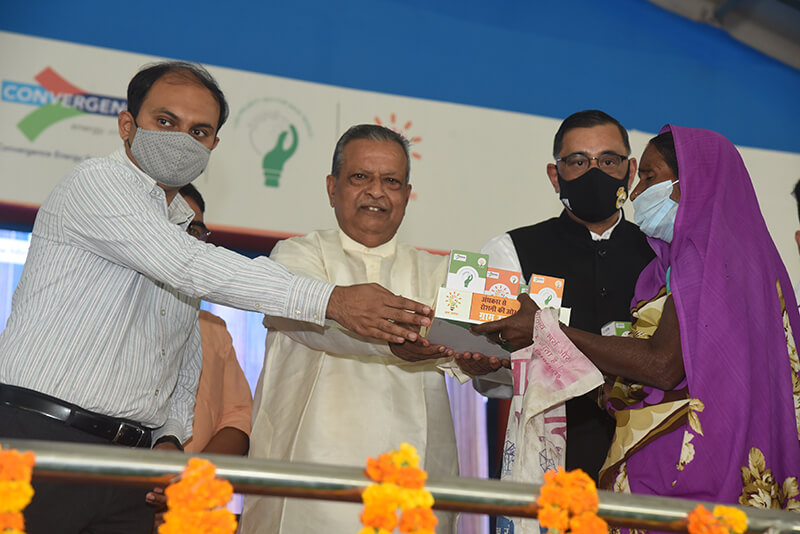Convergence business models essentially operate closer to consumption thereby improving efficiencies in distribution of energy to last mile users. Demand-side energy efficiency schemes of national and state governments have been identified and partnerships created for distribution generation at scale. The Chief Minister Solar Agriculture Feeder Scheme of Maharashtra and the Solar-water pump based PM-KUSUM program (Pradhan Mantri Kisan Energy Security and Upliftment Maha Abhiyan) are key policies being implemented by Convergence.

CESL develops a portfolio of decentralized solar projects. Electricity Sale from Solar to DisCom at a tariff of lesser than Average cost of power supply (ACoS), range of which across states is generally between INR 4-7/kWh. The projects are aligned with central governmnt's vision for 175GW RE power and targets of Ministry of New and Renewable Energy. States policies for enhancing agricultural irrigation system are also utilized and DISCOMs benefit by meeting their Renewable Purchase Obligation (RPO). In addition, the projects leed to environmental benefits and create local employment opportunities.
Projects
- Ground Mounted Decentralized Solar Power Plant: Purchase Agreement for 779 MW of Decentralized solar Plant signed with Maharashtra under EESL Group. Til date, CESL has commissioned cumulative capacity of 164 MW across 135 sites within the state. Another 90 MW of decentralised projects are under various stages of development. CESL is also to implement 110 MW under feeder level solarisation of component C of PM KUSUM scheme in Goa.
- Solar water pump: CESL will also supply 11,000 energy efficient agriculture pumps and distribute 16 lakh LEDs under its convergence model in the State of Goa. Unique aggregation models for switching from diesel and electric-based pumps under PM KUSUM scheme are being developed by CESL.
- Solar Roof Top: Contributing to Nation's solar rooftop target, CESL is setting up 50 MW grid-connected rooftop solar systems at Government buildings. CESL has tied up with the State of Tamil Nadu to undertake this initiative.
- Other strategic initiatives: Solar Home Lighting Systems have been distributed to unelectrified rural households in Goa, Strategic initiatives like floating solar in Goa, battery-based mini-grid in Ladakh, storage supported solar cookstoves etc. are being explored through feasibility assessments and technical partnerships.
Implementation status can be viewed in the Project Tracker.
Investment
- Project implementation meets the global social and environmental standards making it ideal for blended finance.
- The Agriculture Solar Feeder Project at Maharashtra had been registered with the Clean Development Mechanism of UNFCCC
- ADB and KfW are primary supporters of the program through low interest debt funding to EESL Group.
CESL and its parent company EESL are amongst the first movers in the e-mobility segment, aggregating demand for electric buses, 2-wheelers, 3-wheelers as well as electric cars for governmnet offices. CESL also operates amongst the largest EV charging networks enabled by a digital backbone that provides critical information through an easy to use app. This made CESL/EESL the prime candidate for scaling up other e-mobility segments such as electric 2 wheelers, electric 3 wheelers and buses.
In June 2021, CESL was nominated as the nodal agency for Government of India's Faster Adoption and Manufacturing of Hybrid and EV (FAME) Scheme led by the Ministry of Heavy Industry, with the mandate to:
- Aggregate demand for 3 lakh electric three wheelers across the country under multiple user segments.
- Aggregate demand for electric buses in 9 major cities including Mumbai, Delhi, Bangalore, Hyderabad, Ahmedabad, Chennai, Kolkata, Sur

Implementation
- Demand for 5,450 electric buses has been aggregated by CESL through a national-level Grand Challenge for Electric Buses. In consultation with NITI Aayog, State Transport Undertakings, leading OEMs, financial institutions, and sector experts the Grand Challenge was designed with a goal to balance contract terms to help make the contracts more bankable and facilitate greater investment in the sector. Through the aforementioned, price reductions of 15-20% are expected against current levels.
- CESL has also aggregated demand for ~150,000 electric 3-wheelers by floating the world’s largest tender for E3Ws for price discovery under eight use cases. 21 Bidders participated in the tender, 12 bidders qualified, and 6 bidders agreed to match, bringing down price by 18-26%.
- Demand for 3000 electric 2-wheelers has been aggregated within 06 month and CESL is in the process of developing partnerships with financial institutions to enable their deployment.
- An online multi-brand portal for purchase of 2-wheeler and 3-wheeler EVs has been launched to aggregate demand from government department and provide direct delivery services. https://www.myev.org.in
- CESL is further deploying Public Electric Vehicle Charging Stations comprising Bharat Standard DC001 (15kW), High-Capacity Fast DC Combo Chargers 142kW (CCS2.0+ CHAdeMO + AC Type II) and Bharat Standard AC001 (10kW), primarily with support from the Department of Heavy Industry for deployment of 1184 EV Chargers across 12 cities in India. Proposals to deploy chargers on 15 Highways and 9 Expressways are also being explored.
- A smartphone application has been developed for customers to track and locate the closest EV. CESL is also in discussions with other Charging Infra Operators to list their charging stations on the app as well making the customer experience richer and more comprehensive.
- CESL has signed agreements for leasing electric cars with 26 clients in 15 cities which includes various Ministries/Govt. Depts., both at Central & State level, PSUs, shared mobility operator etc., building a presence in 43 cities.
- CESL has also been nominated as the nodal agency for administering state incentives in Goa and a similar nomination is currently under discussion for Delhi.
Investment opportunities
- Central subsidy allocations under FAME-II and state subsidies are passed on to the consumer, leading to price reductions of up to 40%.
- Multilateral funding from Asian Development Bank and KfW Germany have been received by the parent company EESL.
- The EV charging infrastructure project is registered with the Verified Carbon Standards or Verra.
- CESL is also developing models to monetize the carbon emissions reduction due to decarbonization of the transport system.
CESL’s integrated e-mobility solution

Solar power charged swappable batteries for 2 and 3 wheelers is being explored to create markets where electric vehicles can be sold without batteries.
Gram UJALA is a flagship program of CESL, launched by the Hon’ble Minister of Power, New and Renewable Energy in Bihar and Uttar Pradesh in March 2021. Energy efficient 7 watt and 13 watt LED bulbs are being distributed at nominal service fee of INR 10 to replace incandescent bulbs of 60W and 100W in rural areas. Convergence is leveraging the international carbon markets to discount the energy saving appliances, making them affordable for rural consumers. On National Energy Conservation Day in December 2021, CESL distributed a million bulbs in a single day. Ten million or one crore bulbs are targeted to be distributed within one year. Read more about Project Crore.

The program is financed through carbon credits and will be the first such program at national level. The scheme is scaling the UNFCCC registered SHINE program and emissions reductions emerging from this program will be traded in the carbon markets. The funds raised through this are passed on to the users thereby making the otherwise INR60 per LED bulb affordable. With an overall target of distributing 300 million LED bulbs, the total energy savings of 40,743 million kWh/year, avoiding peak demand of 22,743MW/year and CO2 reductions of 37 million tons per year is expected.
Convergence has tied up with C-Quest Capital to support in carbon credit trading. The following will be undertaken by the partner:
- Develop and fund the registration of the Projects to be included with respect to Indian states and/or electric distribution companies of EESL’s choosing.
- Carry out initial surveys and ongoing metering surveys to collect data for future verification and auditing.
- Manage and fund the 3rd party monitoring activities required for carbon credit issuance.
- Manage and fund designated operational entities (“DOE’s”) for all project activities including the verification and issuance, and transfer to buyers of carbon credits.
CESL is managing the master database of customers and finding the registration process for Verra/CDM/UNFCCC.